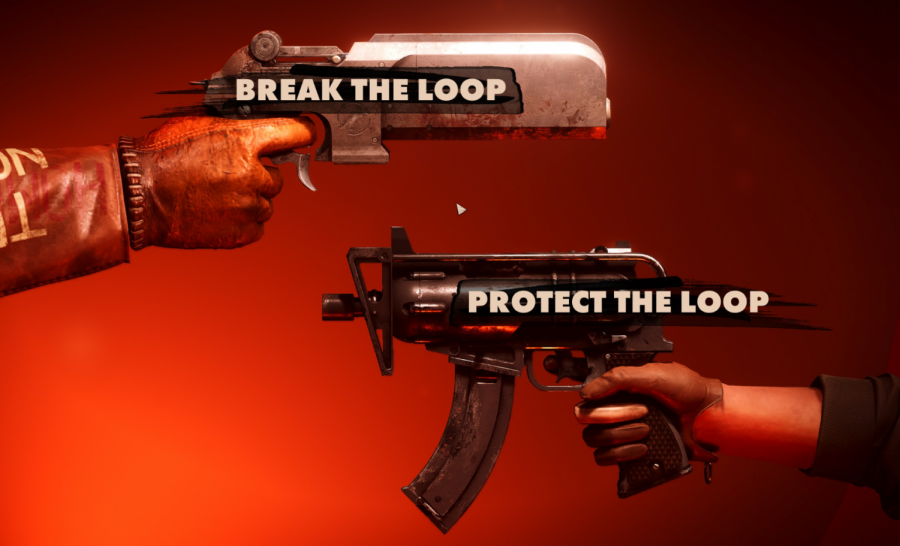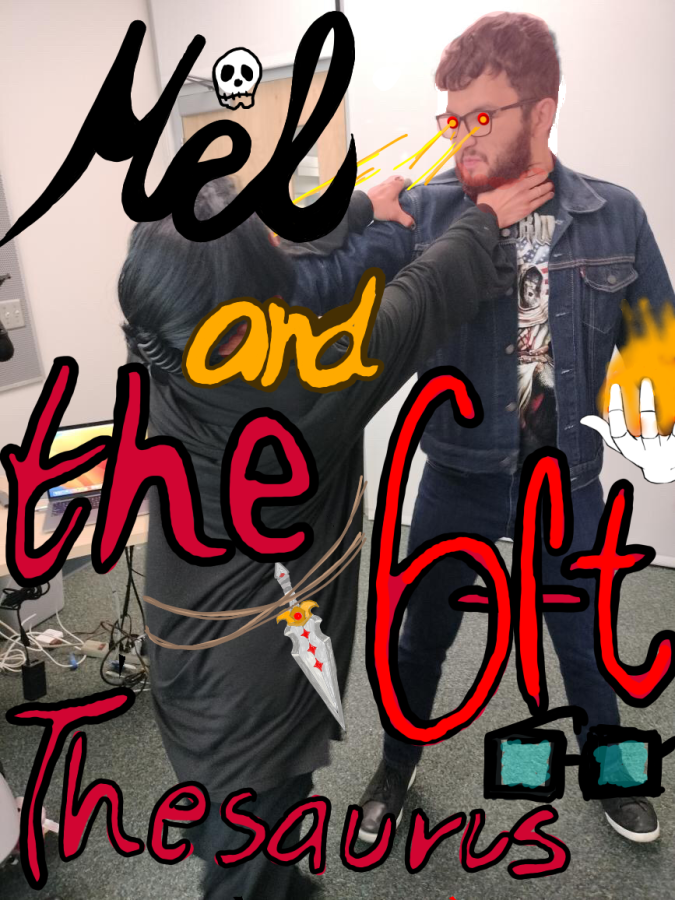Matthew: Hello, this is the newly-instated—and maybe, temporary, Cerritos-based gaming podcast, which I will designate as Sidechat. I am Matthew Espinosa, one of the Talon Marks staff writers that work here, and today, I am joined by James Kham, a student who attends Ivy Tech Community College in Indiana, except as a chemistry major. This session, we will debate whether singleplayer or multiplayer games are better than one another—or if both are equally as good.
James: Hello, you can call me James.
Matthew: Good to have you, James. Specifically, we’ll gloss over the ups and downs of both sides before weighing them against each other; after that, we’ll delve a bit deeper and analyze specific games to determine exactly which areas they did or didn’t succeed. And to end it off, we’ll list off what we have discussed and issue our final analysis. Before we start talking in more detail, do I have your explicit permission to record this session?
James: Yes, yes, you do.
Matthew: Alright then, let’s proceed with our business. Since I play singleplayer games more often, I’ll argue against James, who in turn, will represent multiplayer. Starting off with pros, singleplayer’s most defining aspects are the emphasis on plot and the player’s ability to set their own pace. This, combined with realistic character interactions can make for an engaging storyline that will forever leave a mark. And with enemy AI that is tough, yet predictable? Singleplayer is a playground where everyone abides by the rules to create a beautifully written story brimming with action and lore. Not to mention, those with the heart of a literary nerd will appreciate the morals that each decision and sequence implicates. However, there can be bugs that can prevent game progression, and the storyline may be so colorless that continuing to play might not even be worth it. To boot, the enemy AI can also act stupid and level progression can leave you feeling like you don’t deserve the win. And if that isn’t enough, the gameplay/combat can feel like you’re controlling a clunky robot that fails to make you feel like you’re in a life-or-death situation.
James: Multiplayer also retains similar aspects, although it’s different given that it’s less focused on storytelling. For example, a toxic environment can discourage players from socializing and induce stress while playing. It also doesn’t help that competitive players make it harder for newer players to enjoy a more casual gaming session. In addition, since it’s a multiplayer game, it will, of course, require a stable internet connection and an adequate gaming setup, both of which may or may not hold up depending on the game’s servers and optimization. That isn’t to say that multiplayer isn’t entirely without its pros. For one, successful gamers [games] can maintain a relatively big player base that will allow for a great deal of replayability and give more [than] enough reason for developers to churn out regular updates and produce fresh content if they’re to keep this large player pool. As such, there’s likewise enough time for players to form friendships and take advantage of enemies controlled by people capable of logic and creative thought to make a potentially gratifying experience. Also! Some games like Counter-Strike have a “pro scene,” where players can compete for the title of the major champions and as a result, win a great deal of prize money.
Matthew: Thank you for your input, James. Now, we’ll move on to discuss specific singleplayer and multiplayer game titles. One such multiplayer title is Apex Legends, a free-to-play Battle Royale that actually has a rich and engaging storyline that centers itself around a cast of unique characters who participate for glory and money in a blood sport known as the Apex Games—which in all, rivals that of a singleplayer story.
James: It’s unfortunate that although the first few games can feel easier and more exciting at lower levels, there is a steep learning curve that makes it tough even for experienced sharpshooters like Shroud to play successfully against other players.
Matthew: Yes, that’s also coincidentally the main reason that I don’t play, but I do enjoy watching the interactions that take place between the characters in the cinematic trailers that Respawn uploads on YouTube.
James: Another popular multiplayer title to throw out there is Grand Theft Auto V, more commonly known as GTA V. That’s also a game where you’ll find a huge load of content that can take hours to fully complete.
Matthew: If you’re not hunted down by a competitive player riding an Oppressor, that is.
James: Of course, but that’s a risk all players take in every multiplayer game. What I feel outweighs the possibility of instant death is the brief moments of actions and encounters with other players that can make for the foundation of a long-lasting friendship. And when players do meet those toxic players that kill mindlessly, you have to admit these kinds of interactions can spark a hilarious memory worth thinking about.
Matthew: Good point! And a singleplayer game I feel is equally matched by these games is Dying Light, which reinforced by a visceral and fluid parkour system, turns this title into an epic adventure, where you assume the role of an undercover agent sent to recover a file stolen by Kadir Suleiman, who also worked for the same organization that dropped you in the city of Harran.
James: Yeah, and there’s also a lot of replayability because of the timed Trials that the game leaves for you to run [through] after completing the main storyline. It was always a challenge to complete those in the set amount of time that they give you.
Matthew: Yes, and a host of challenging enemies ranging from the predatory Volatile and savage Demolisher to run from or fight.
James: Another point I’d like to add is the fact that The Following DLC is almost like they added a whole new story to the game that has increased the fun factor by ten with new elements like driveable vehicles.
Matthew: Thanks for mentioning that, James. Another example of a singleplayer game—or rather franchise—I feel is worth mentioning is the Halo series; I have to admit that I’m a little biased on this part, but Halo is a classic that I believe delivers its pound of fun even in this day and age of gaming. Its gameplay is simple yet intricate because of the enemies that you’re faced with; these extraterrestrial threats, these “Covenant” as they are called, are assigned specific jobs by species and each race is beholden to weaknesses easily exploited by the player if they’re quick and intelligent enough to see them and the opportunities that present them.
James: That sounds cool, but it also feels sorta outdated. Like, unless you’re playing more recent additions like Halo 5 and 4, it’s almost been like a solid decade since the earlier Halo games were released, and people are more likely to play other shooter games that fit more into the playstyles that they’ve been using in other games like Call of Duty, where it’s more fast-paced and dependent on quick reactions.
Matthew: Yes, Halo is outdated; in fact, there are missions in Halo: Combat Evolved that feel repetitive, and although there is lore to back these moments, the most prominent reason this repetition is featured was because of a lack of time and funding. However, if Halo is given the opportunity, players will be surprised by the feeling of exhilaration produced by the enemy AI’s response to player actions as well as the doomsday storyline of stopping the Covenant threat from wiping out everyone with the power of the Halo Array.
James: Hmm, I see your point; maybe what you’re also trying to say is that this departure from today’s quick-response playstyle is satisfying enough to warrant extra time. I haven’t personally… played Halo that much and given that fact, I think that with the amount of playtime I’ve invested in more modern multiplayer shooters and yours in Halo allows for… Uhm, let’s call it a unique standpoint that acknowledges that it has both engaging and out-of-touch gameplay.
Matthew: Yeah, let’s leave it at that. Oh! And I think that’s about it for our discussion! What do you say to handing out our verdict on multiplayer versus singleplayer?
James: Oh, yeah, I would like to think that both multiplayer and singleplayer games are equally good—and that both will always have imperfections, small and big. Although, I think that in this day and age, multiplayer games have become more relevant, especially with releases like Splitgate and Warzone.
Matthew: Yeah, I suppose I also agree that both are great; that both are designed to tickle those parts of the brain that, as you said before, give us that feeling of exhilaration and accomplishment. Hopefully, future games such as Far Cry 6 and Forbidden West will garner more interest in singleplayer games. Anyways, folks, thank you for taking the time out of your day to listen to us ramble on about pixels.
James: Thank you for letting me join, and goodbye, too!
Matthew: You’re welcome, James, and see y’all later!
















